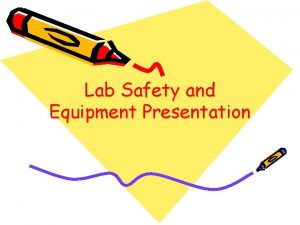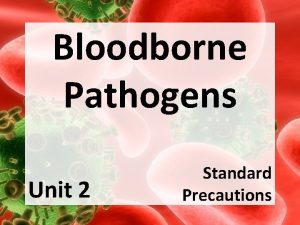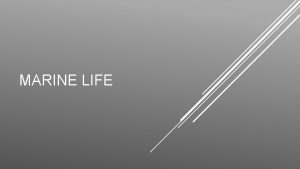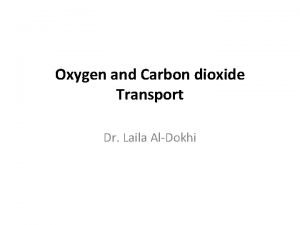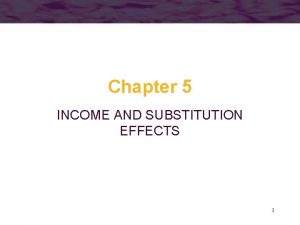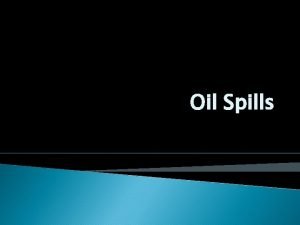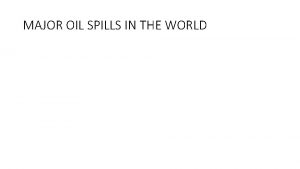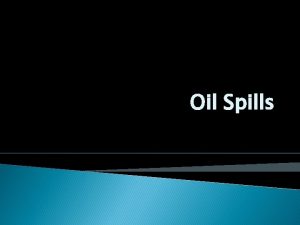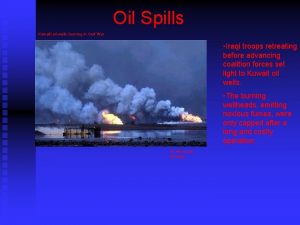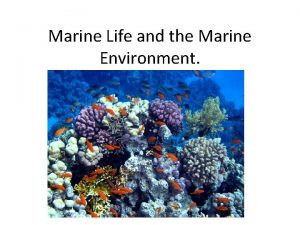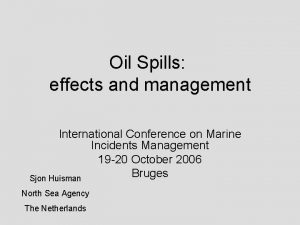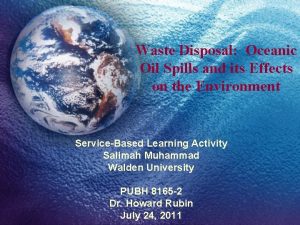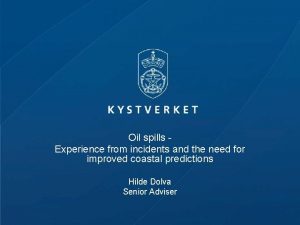OIL SPILLS and their effect on marine life









- Slides: 9

OIL SPILLS and their effect on marine life By Samantha Woods 11 IOI KIDS 2010 BEST PROJOCT COMPETION

BP OIL SPILL • • • Oil spills happen all the time all over the world. These spills are killing our sea life, and on occasion endangered animals are being driven to extinction. The latest of these oil spills is in the gulf of Mexico, and as you are reading this, sea creatures are perishing. Both the spill and the cleanup programme are killing the sea life. Sharks are coming closer in to shore and scientists are finding more and more oiled and endangered turtles. It is also no longer safe for human beings to go to the beaches as the oil has now reached the shore and contaminated the shoreline. Something has to be done about these oil spills and it has to be done fast!

OIL SPILLS • • • Oil spills happen when people make careless mistakes which result in leaks in oil tankers. Some oil slicks are caused through ships cleaning out their tanks at sea. Oil pollution can also happen when two countries are at war and one country will dump oil into their opponent’s ocean. Oil spills are also started by terrorists dumping gallons of oil into a country’s ocean to deliberately destroy their fishing. Factories will dump crude oil into the ocean because it is cheaper than disposing of it properly. A hurricane needs to be just a few miles away to have the power to flip an oil tanker over spilling oil into the ocean.

Affects oil spills have on animals • • • Birds can die from oil spills. Their feathers become covered in oil and they try to clean them and poison themselves by swallowing the oil. Sea animals can die if the oil gets into their lungs or livers. Animals may also be blinded by the oil making them unaware of the presence of their many predators.

THE SEA OTTER • • • Sea otters are affected by oil in many ways. The otters’ bodies may get covered in oil, which causes build up in the otters’ air bubbles. These air bubbles are located in their fur and help to insulate them to survive the cold oceans. The bubbles act like a covering for their body and help the otters to float. When oil builds up in the air bubbles, the otters may die of low body temperature. Many sea otters have to be placed in captivity after an oil spill until the otters are cleaned and ready to be released to live in the ocean again.

THE KILLER WHALE {ORCA} • Oil spills are one of the many causes that have resulted in killer whales becoming endangered. The oil may be eaten or enter the whale’s blowhole. A blowhole is a hole on the whale’s head through which they breath. Whales will rise up over the water to take a breath. If the blowhole is plugged with oil, the whale can not breathe. • The main reason for whales dying as a result of a spill is when they eat a fish that swam through the oil. If a fish swam through the oil, the whale will eat the oil along with the fish. Because the whale has eaten the oil, it will be poisoned, and it will die. • When hundreds of plankton die because of oil pollution, that species of plankton may become extinct. Then, fish won’t be able to eat the plankton, and they will also become extinct. As a result of this, the killer whale could then become extinct because it does not have the fish to eat.

HOW MANY ANIMALS RECOVER AFTER 10 YEARS The table below shows all the animals that have recovered, are still recovering, or are not recovering, and where the recovering is unknown. It shows that the populations of only two species have recovered ten years after a major oil spill. It also shows how many animals are still recovering ten years later. RECOVERED ANIMALS RECOVERING ANIMALS NOT RECOVERING RECOVERY UNKNOWN Cutthroat Otter Dolly Varden Kittlitz Murrelet Rockfish Common Loon Cormorant Harbour Seal Harlequin Duck Killer Whale Pigeon Quillemont Black Oystercatcher Common Murrelet Marbled Murrelet Mussel Pacific Herring Pink Salmon Sea Otter Sockeye Salmon Bald Eagle River Otter

If we do not take action soon to prevent further oil spills from taking place, our children will never have the privilege of seeing some of the magnificent creatures that we have enjoyed.

Stop pollution! Look after our World



